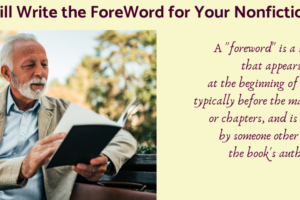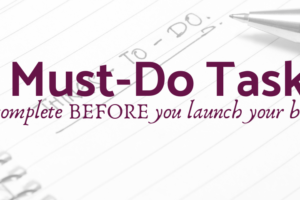18 Valuable Insights for Indie Published Authors in Today’s Publishing World
And it’s Friday the 13th, everyone. Who’s afraid of black cats and ladders? Not I. I am quite fond of black cats. And ladders are just that, ladders. Yes, I would walk under one without worry. As we approach Halloween, the colors black and orange will be popping up everywhere, even on book covers. Is your book suited to a black and orange cover – to be promoted during Halloween?
This week, given we are now into mid-September, I thought I would write about the changes in publishing today to highlight the fact that publishing is an ever-changing industry and what works today may not work in 2025 or beyond. Time to review as we write our books to be released in the coming year.
Publishing has undergone a remarkable shift in recent years, empowering writers as never before. As your book coach, I felt it necessary to share these 18 valuable insights to help you navigate the bumpy, rocky realm of indie publishing.

The Changing Face of Publishing
At MBB, we believe Indie is the new mainstream: Self-publishing, now more accurately called indie publishing, has shed its stigma. Many bestselling authors are choosing this route for creative control and higher royalties. And they’re working with professionals to make sure their books are of the highest quality.
Digital dominance: E-books and print-on-demand have revolutionized distribution, allowing authors to reach global audiences without large upfront costs. Understand that you can create several e-books about your industry and your climb to success and gather them all into a full book when you’re ready. Will people buy it? Yes, they will. The chance to have all the information in one place is always attractive to book buyers.
Hybrid approach: Some authors successfully combine traditional and indie publishing, maximizing their reach and income streams. This means working with a small press publisher who does not offer all the bells and whistles you need. Just be aware of exactly what your hybrid will do for you and what your responsibility will be to make the book a success. (I’m pretty sure the marketing will be your job.)
Before You Write
I stress this in every conversation I have with new authors. Know your “why.” Be honest about your reasons for writing: Is it to share knowledge, entertain, or build a business platform? Remember, the reader is the boss of you.
Target audience research: Understand your ideal readers’ preferences, habits, and pain points before you start writing. Create an avatar of your reader. Create several. You won’t have just one kind of reader. But don’t go too wild. Yes, you want ‘everyone’ to read your book, but not everyone will. Choose your avatars carefully and be ready to help them market your book to their networks.
Genre conventions: Familiarize yourself with the expectations of your chosen genre. This means checking Amazon for other books like yours. Yes, they are out there. You are not the first or only one to write about whatever it is you’re writing about. Visit a physical bookstore and make note of the books they have on their shelves and what they’re putting in the window to entice people to come in a shop. How does your book match up?

Crafting Your Masterpiece
Plotting vs. pantsing: Decide whether you prefer detailed outlining or discovery writing, or a combination of both, as in “writing by the seat of your pants.” Are you good sitting for long periods of time in your chair – pantsing it? Or do you need interaction with your book coach or the person you’ve chosen to keep you accountable? Someone to help with that outline and progression of writing, to keep the flow moving nicely? I’ve found that most authors are a combination of both. But there are authors who can write their book nonstop in three weeks or three months, with a minor outline, or just something they have in their heads. Career coach Deborah Brown-Volkman comes to mind. She wrote her recent book, Childhood Trauma. Some rise. Some fall. How to be one of the lucky ones who get back up, in only three weeks!
Writing software: Explore tools like Scrivener or Atticus that cater specifically to book writing and formatting. Consider adding Grammarly to your device. While it does not replace a human editor, it can help fix those commas and apostrophes and some spelling errors. It cannot replace a human because it does not understand voice. Your voice is extremely important! Don’t let any AI tool change it or alter it. Readers can tell.
Beta readers: Cultivate a group of early readers to provide feedback before professional editing. This is so important! Beta readers are the lifeblood of your book! They are the ones who write and say, “Great! Well done. I get it.” Or “I was confused here. What did you mean?” You need that feedback well ahead of sending out for your print proof.
Polish and Professionalism
Editing is non-negotiable: Invest in professional Developmental, line editing, and proofreading. These are all necessary and will make your book better. Those of us who do this know that the final polish on a book before it is published makes it shine like a 50-carat diamond!
Cover design: Who is designing your cover? Not you, I hope. Unless you’re a professional cover designer. This is not a task you can do yourself or give to your cousin who designs banners on LinkedIn. Your book cover is your most important marketing tool. Hire a professional designer who understands genre expectations.
Formatting finesse: Ensure your book looks professional in all formats – e-book, print, and audiobook. It’s your book. It represents you. Make it shine.
Publishing Platforms
Amazon: Amazon is not to be ignored. Whether or not you choose Kindle Direct Publishing to publish your indie published book or some other form of publishing, you must have a presence on Amazon. Love’em or hate’m, Amazon is customer focused. And you want that. The easier it is for me to buy your book, the better. While the sale of books is not Amazon’s biggest money-maker, “it’s no surprise that it dominates the online book market.”
Another great resource is BAM – Books-A-Million. Check it out for your book. Make sure to visit the Millionaire’s Club and the Business Services option.
And check out Ingram Spark, too.
ISBN essentials: You cannot sell a book without an ISBN. Well, not in bookstores. The ASIN Amazon offers is for its inventory control, it’s not an ISBN. You can accept a free ISBN from Amazon, but it will not allow you to sell into libraries or bookstores. Visit Bowker and buy your own ISBN. We recommend a group of 10 because your print book, e-book and audiobook will each need their own number, and you know you’re going to write more books. Don’t you? (We have a tutorial on how to fill out the forms which we give to all of our clients – if you leave a comment here, I might be inspired to offer it to you, too.)
Metadata mastery: Craft compelling book descriptions, author bios, and keywords to improve discoverability. So important! What will your hashtags be? How will you describe your book on Amazon and elsewhere? You may want to fiddle with AI for this. ChatGPT or Perplexity (which helped me write this newsletter) could help you get started. Remember, they are not human, so revise and edit everything they share.
Marketing in the Digital Age
Author platform: Yes, you need a website, a blog, and more than one social media account. Preferably before your book is launched. You should be active online and connecting with possible readers. Be the biggest cheerleader for your book that you can be – but don’t go overboard! It’s about the content and what it can do for your readers. It’s not about you.
Email list power: Start building your mailing list early – it’s one of your most valuable marketing assets. Without having a list before publication, you risk scrambling to catch up with others who have a list and are marketing their books – similar to yours – to their list. Having a list also enables you to cross promote with others. Share their book with your list and your book with theirs.
Financial Considerations
Pricing strategy: Research your genre’s pricing norms and experiment to find the sweet spot for sales and royalties. Do a week or two promotion of the e-book at $0.99. This generates interest and shows Amazon’s algorithm that you’re serious about your work.
Multiple formats: Maximize income by offering e-book, paperback, hardcover, and audiobook versions.
Tax implications: Familiarize yourself with the tax obligations of being an indie author in your country. Here in the U.S., we recommend starting an LLC. This is your publishing entity, if you don’t already have a business entity to use.
Continuous Learning
Stay informed: The publishing landscape is ever-changing. Join author groups, attend conferences, and follow industry blogs to stay updated on best practices and emerging trends.
Remember, success in indie publishing comes from a combination of great writing, professional presentation, and savvy marketing. At Master Book Builders, we’re here to guide you through every step of this exciting journey.






1 Comment
Leave your reply.